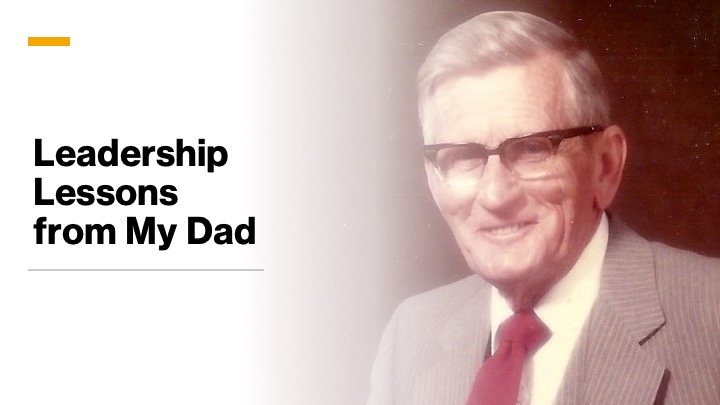My father taught me many valuable lessons. He taught me what it meant to be a follower of Jesus. What it meant to be a husband, father and grandfather. But I suspect most men can say the same about their old man. I also had the privilege of learning leadership lessons from my dad.
As I write these words, we are just a few days away from the 100th anniversary of my Father’s birth. September 30, 1920. Dad was born just a few miles from where I am writing this article, in another Birmingham neighborhood. He was born in Birmingham. But he grew up in Pike County, Alabama. I previously wrote about his life in A Good Name. If you haven’t read that article, I suggest you take a moment to do so. It will help you understand this 5′ 9″ 140 lb, giant of a man.
Dad first went to work for Troy University as the Director of the Fort Rucker Residency Center. Under his leadership that residency center grew from a few dozen soldiers to a fully-accredited regional university in Dothan, Alabama serving thousands of students and offering associates, bachelors, masters and specialist degrees in four colleges and schools.
For more than twenty years I had an up-close and very personal view of my father’s leadership. I remember going to work with him when I was a kid. The highlight was getting a bottled Coca Cola out of the drink machine. Buying lunch from the food truck was also special. But mostly, I just enjoyed being with him. Later, I attended the university where he served as the founding president. I earned two diplomas that he handed me as I walked across the stage. After he retired, his successor brought me onto campus as a part of his administrative team, which meant I got to see the results of his leadership.
Here are some of the leadership lessons my dad taught me. These are in no particular order.
1. It’s good to get out of the office.
There are some things a leader must do inside of an office. Or a conference room. Meetings. Briefings. Studying reports. But it was not unusual for Dad to get out of the office. The main building on the Dothan campus of Troy University in those days was an eight-story converted hotel in downtown Dothan. The executive office suite was on the first floor with various colleges, schools, and departments occupying entire floors above.
Dad enjoyed walking through the crowd. He enjoyed riding the elevator with students, faculty and staff. He often stood in a corner of the main lobby visiting with whomever stopped to chat. But he also practiced something I find incredibly important. Unless the situation warranted it, Dad never called faculty or staff to his office. He went to them. His lack of pretense put people at ease. It also created a positive work culture.
2. Don’t be afraid to change.
Academic institutions are worse than churches when it comes to change. In some ways that is good. But it can also stifle growth opportunities. In the early days when the university first occupied the former hotel, constant change was necessary. Imagine converting an old hotel with small rooms and shared bathrooms into a university. The process took several years. Which meant that no one could settle into their space. Everyone had to be flexible.
After the building was completely converted, he continued the practice of change based on the needs at the time. Departments changed office suites and classroom assignments. He wanted his faculty and staff to be flexible so they could meet the needs of their students.
3. Don’t lose sight of the mission.
Dad firmly believed that the students were the mission of the university. He often said, “If we don’t have students, we have no reason to be here.” One reason he liked getting out of the office was to mingle with students. He wanted to know how they were doing. Most of them were adults going back to school. Some were starting from scratch. Others were completing a degree they started but never finished. All of them had challenges that were unlike the traditional 18-24 year-old student. The students were the mission.
4. Treat people the way you want to be treated.
My dad believed in second chances. He believed in third chances. I watched him be incredibly patient with faculty and staff. Frankly, they often should have been fired. He admitted that. But I also remember him saying about one staff member, “She’s a single mom. I need to help her.” More often than not his patient and caring approach to hands-on leadership worked. Fifteen years after Dad retired, my wife enrolled at the university. That single mom was still working!
Happy birthday, Dad. Thanks for everything. I am a better leader because of your example!
_________________________
Rob Paul is a church revitalization strategist with over three decades of experience serving established Southern Baptist churches in pastoral ministry. He has helped churches in Alabama, Mississippi and Georgia to experience revival and revitalization by God’s grace and for His glory. He is currently serving as the senior pastor of Huffman Baptist Church in Birmingham, AL. To find out more about Rob Paul Ministries and the work of church revitalization, visit https://robpaul.net

